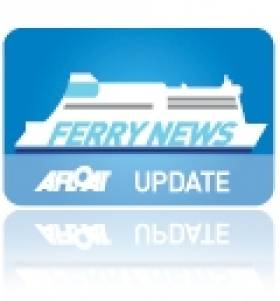Displaying items by tag: New Celtic Link ferry
New Celtic Link Ferry on Re-Positioning Voyage off Africa
CLF are to charter Celtic Horizon for a five-years and the 25-knot capable vessel will takeover the existing thrice-weekly round trip sailing schedule from ro-pax Norman Voyager. Between 2 January -19 February 2012, CLF will be the only continental ferry operator running services as rivals Irish Ferries will be taking their cruiseferry Oscar Wilde for annual dry-docking. To read more click HERE.
In addition there will be no sailings between Cork-Roscoff, as operators Brittany Ferries last sailing for this year is 29 October, served by 'flagship' Pont-Aven. The 2012 season starts in late March.
Celtic Horizon is the first vessel to be named with a 'Celtic' prefix of part of their ferry operations, since the company brought European Diplomat from former route operators P&O (Irish Sea) in 2005. The freight-ferry renamed Diplomat, served Celtic Link Ferries until 2009. Since then she has been on charter in the Caribbean until this summer when she was sold to the breakers in Alang, India. To read more click HERE.
As for Celtic Horizon, she was built in 2006 and spent her last season this year as Cartour Beta while on charter to C&T's routes between Naples and Sicily, to read more click HERE. The 186m ro-pax is believed to be heading for Gibraltar while en-route to Rosslare.
During her Irish service, she will maintain Italian registry of Bari whereas her predecessor Norman Voyager changes flags from the UK to that of the French tricolour. Both vessels are similar as they share a ro-pax design which has proved popular for Italian shipbuilders Cantieri Navali Visentini.
The 2008 built Norman Voyager of 26,904grt is to revert to LD Lines operation and used on their 'Motorways of the Seas' St. Nazaire-Gijon service, though she was to enter on the Marseilles-Tunis route. Her new role on the Franco-Iberian route sees the replacement of Norman Asturias.
























































